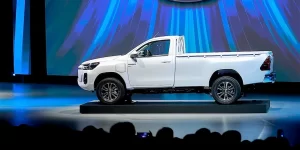
Toyota Motors unveiled its first battery electric vehicle (BEV) pickup truck this week in Thailand. The EV prototype is generating interest among buyers and looks street-ready, but buyers are asking, will Toyota sell its electric pickup in the US?
Will Toyota’s electric pickup truck make its way to the US?
At its 60th Anniversary of operations in Thailand, Toyota revealed the Hilux Revo BEV prototype, its first fully electric pickup truck.
Since the EV truck is built for consumers in Thailand, it’s designed to serve a different purpose. Thai drivers often prefer a versatile pickup that can do it all with a mix of passenger and cargo space.
Looking at images of the Hilux Revo BEV, you can tell it’s designed for the Thai market. Toyota’s EV pickup looks to be in the mid-size range, with a single cab and extended bed. In addition, you can see details indicating it’s built for work with tie-down hooks on the outside of the bed rails.
The electric pickup closely resembles its Hilux truck line, but of course, without the diesel engine. The Thai market is dominated by pickup trucks, where Toyota’s gas-powered Hilux Revo trucks are a top contender.
Thailand is Toyota’s fourth-highest production center globally, behind Japan, China, and the US.
Although Toyota didn’t offer specifications, the EV pickup features a charging port on the front left fender. Toyota’s CEO, Mr. Akio Toyoda, said at the event that the electric pickup is “designed to support carbon neutrality and a better environment for all.”
As for US customers, I wouldn’t get my hopes up for the electric vehicle to make its way here. The company’s CEO reiterated its hybrid approach going forward, claiming:
At Toyota we believe in creating a full portfolio of carbon reducing choices for our customers from hybrid electric vehicles, plug-in electric vehicles, battery electric cars, and fuel cell vehicles. Also, we are pursuing hydrogen fuel options like these GR-Yaris and GR-Corolla hydrogen powered concept cars. As we work to achieve a sustainable future, I also believe we need to take a holistic approach to carbon neutrality.
He added:
I am often criticized in the press because I won’t declare that the automotive industry should commit 100% to BEV. I believe we need to be realistic about when society will be able to fully adopt Battery Electric Vehicles and when our infrastructure can support them at scale.
Toyota has a long history of lobbying against going fully electric. Despite this, the world’s largest automaker has made several initiatives to better compete in the EV market in the past several months.
